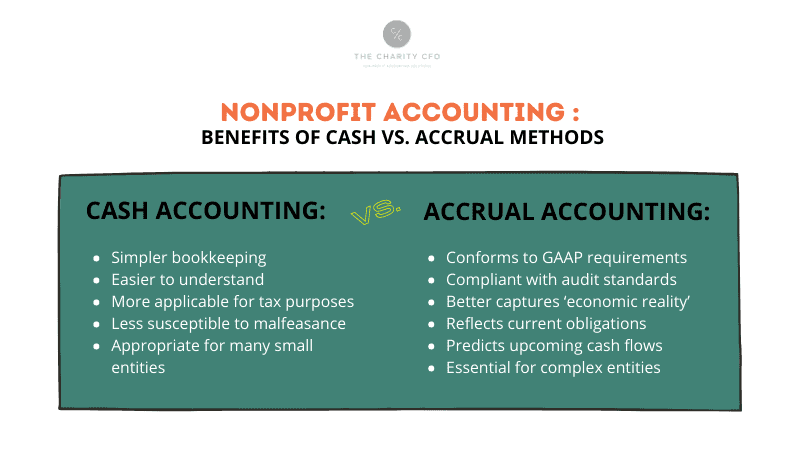Do Nonprofits Use Cash or Accrual Accounting?

If you’re like many people, you probably think that there is a single set of accounting rules that every company must follow.
But that’s not quite true—nonprofits face a decision between 2 different accounting methods for tracking their financial activity: cash accounting vs. accrual accounting.
Though both systems use the same numbers, looking at those numbers differently can give you a very different perspective on the state of your finances. And understanding the key differences between the two systems will help you minimize confusion when discussing your financial position with board members, funders, or other stakeholders.
So which accounting method is right for you? Is your nonprofit required to use accrual accounting? And is it time for you to switch to accrual from cash basis accounting?
If you’re searching for answers to these questions, you’ve come to the right place!
Cash vs. Accrual Accounting: What’s the difference?
The core difference between cash and accrual accounting systems is when you record financial transactions.
In a cash accounting system, you record and recognize revenue when money is received. And you record and recognize expenses when you spend money or pay bills. Cash accounting is the more straightforward option, since it follows the movement of cash into or out of your checking account similar to how you might manage your personal checkbook.
In accrual accounting, you record revenues when they are earned or pledged. And expenses are recorded when they are incurred. So the accrual accounting system doesn’t focus on when cash changes hands. Instead, it is concerned with when services are rendered, or a commitment is made.
Accrual basis accounting is the more accurate accounting method because it matches revenues with expenses in the same period in which they occurred.
PRO TIP: Most very small nonprofits operate on a cash basis because it is easier to understand and requires less accounting experience. As an organization grows, it will generally switch to accrual-basis accounting for reasons we explain below.
What is the Accrual Accounting Method?
When using the accrual method of accounting, your nonprofit records money when it is pledged (or earned), regardless of when the money is received. You also recognize expenses when they’re incurred rather than when the payment is made.
Under this method, pledges are recognized as revenue on the date the pledge is made, not when you receive the money. So, if today a donor pledges to donate $100 to you next year, you’ll record that donation today rather than next year when the money will arrive in your bank account.
Similarly, if you receive a $100 electric bill on December 30th, you’d record that expense when you receive the bill (this year), and not when you pay it 2 weeks later (next year).
Accrual accounting allows you to match your expenses with your revenue in the period in which they occurred. It also allows you to properly recognize the value of non-cash assets or liabilities that may offset revenue or expenses in that period (like when you sell inventory or receive in-kind gifts).
Furthermore, accrual accounting is required by Generally Accepted Accounting Principles (GAAP) because it gives you a more accurate picture of your organization’s fiscal situation and allows for easier side-by-side comparison with financial statements of other organizations. And many large grantmakers, foundations, and banks may insist on accrual-based financials to give you funds.
A note about accruals and accrual accounts:
‘Accruals’ are the basis of accrual accounting. An accrual is an adjustment made to your book without cash being exchanged. So when you record a pledged donation that you haven’t yet received, that is an accrual entry.
Accrual accounts exist to track your accrual transactions and their balances, according to the type of transaction. Common accrual accounts include:
- Accounts receivable
- Prepaid expenses
- Inventory
- Fixed assets
- Investments
- Accounts payable
- Accrued expenses
- Notes payable
What is the Cash Accounting Method?
The cash accounting method requires companies to report money when it is received, which means nonprofits will record cash as revenue the moment they deposit it in their bank account. It’s easier than accrual accounting because it mostly tracks the flow of cash in or out of your bank accounts.
Consider the same example as above: A donor promises today to donate $100 but they won’t give you the money until next year. If you run a cash accounting system, you would only record that donation in your books next year when you receive the money in your bank account.
The scenario is similar for expenses–imagine you receive a $100 electric bill on December 30th and pay it 2 weeks later. Under the accrual accounting you had to record the expense in December, when you received the bill. But under cash accounting, you would record the $100 expense in January, when you paid the bill.
Cash accounting is less complex than accrual accounting. And it may be the right choice for small nonprofits that don’t have experience with accounting, the budget to hire help, or time to learn.
In a cash system, the permanent accounts consist exclusively of cash and equity accounts, so there are no accounts payable, receivable or fixed asset accounts. And cash basis reporting may be used for some tax purposes, even for accrual-based organizations. (Fortunately, most accounting software makes it easy to switch between cash and accrual-based reports with the push of a button.)
Cash accounting does not comply with Generally Accepted Accounting Principles (GAAP) for nonprofit organizations. So if you expect to grow or search for new sources of funding, you’ll probably need to graduate to accrual-basis accounting.
PRO TIP: Only organizations with less than $26M in gross receipts over a 3-year period are eligible to use cash accounting, per the IRS. Also, revenue must be recorded when it is actually or “constructively” received. Income is constructively received when an amount is credited to your account or made available to you without restriction, regardless of whether or not it’s been deposited in your bank account.
What is Modified Cash Basis Accounting?
Some nonprofits use a hybrid accounting system called modified cash basis accounting. In this system, you generally recognize revenues and expenses as you would in cash-basis accounting (when money enters or leaves your account).
But modified cash accounting also allows you to record long-term assets according to the matching principle. This means that you may have accounts for things like fixed assets, investments, and notes payable that you would track using accrual accounting methodology.
Which accounting method is more effective?
When deciding between cash vs. accrual accounting for nonprofits, there are a few things you should keep in mind.
- Amount of accounts payable and receivable – If you only have significant unpaid invoices or pending gifts, accrual basis accounting is probably a must to help you accurately understand what you owe to others and what is owed to you.
- Bookkeeping staff/volunteer expertise — Accrual accounting is more sophisticated and time-consuming. When determining which approach to utilize, consider the expertise level of the person who will be doing your books.
- Cash flow situation – When cash flow is a concern, accrual accounting can help you see upcoming revenue and expenses to better understand what your future holds.
- Your organization’s size – A small nonprofit can continue to operate on a cash basis relatively smoothly. As increasingly complicated transactions develop, a firm that seeks to grow will almost certainly switch to accrual accounting.
- Financial statement audit or review – if you are required to undergo a financial statement audit or assessment, using the accrual method to be in accordance with GAAP will make the process much smoother and less expensive.
Is Accrual Accounting a Requirement For You?
Here are some additional reasons why organizations should utilize accrual accounting:
Do you need to undergo an audit?
If your bank, funders, or state of legal domicile require an annual audit of your financial statements then you’ll need to use the accrual basis of accounting.
The rules governing independent financial audits for nonprofits can be complex, so do your research. But here are a few triggers to look out for:
✔️ You receive over $750,000 per year in federal funds
✔️ You are in one of 26 states that require an audit of all nonprofits
✔️ An annual audit is required by your organization’s bylaws
✔️ You spend over $500,000 per year (in most states)
✔️ You want to get serious about grant funding
✔️ You want to apply for a loan
This is not a comprehensive list, so speak to your lawyer or financial professional to be sure whether or not you require an audit.
Accurate Budgeting for Your Nonprofit
Cash accounting is simpler and faster but it’s not ideal for creating accurate and actionable financial plans. By matching revenues and expenses in the period they occurred, accrual-based accounting gives you a more accurate picture of when you’re making or losing money.
And when you use your financial reports to create plans and budgets, having that accurate month-by-month data will help you develop more accurate projections to use your resources more effectively.
For these reasons, accrual accounting is preferable for organizations planning for growth. But whether you start with accrual accounting now or make the switch later depends on the day-to-day reality of your nonprofit today.
Need to get Your Accounting in Order?
Whether you’re running an accrual or cash-based accounting system, at some point most nonprofits need to turn to outside help to get their financial house in order.
The Charity CFO helps over 150 nonprofits nationwide modernize, optimize and digitize their bookkeeping and accounting to save thousands of hours every year.
Outsourced accounting from expert nonprofit accountants could be the secret sauce your organization needs to finally create the time, space, and resources to pursue the growth you’ve dreamed of.
If you’re struggling to build the right team to get your finances on track, maybe it’s time to stop struggling…
Reach out to discover how we can make your life so much easier
We’ll show you how much more enjoyable it can be to run a nonprofit when you’ve got all the financial data you need at your fingertips!










